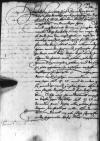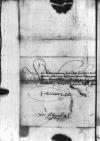List #2631
Gdańsk Town Council do Ioannes DANTISCUSGdańsk (Danzig), 1543-02-12
| odebrano Heilsberg (Lidzbark Warmiński), 1543-02-15 Rękopiśmienne podstawy źródłowe:
| ||||||
Tekst + aparat krytyczny + komentarzZwykły tekstTekst + komentarzTekst + aparat krytyczny
Dem Hochwirdigstenn inn Gott Furstenn unnd Herrenn, herrenn
Hochwirdigster inn Gott Furst, gennediger herre. /
Unnser bereidtwillige unnd unvordrossene dinst[e] seinndt Ewer Hochwirdige Gnade besundern fleisses zcuvoran entpholenn. /
Genediger herre. /
Szo unnd nochdeme wir denno / am jungsten du[rch] unnsers raths sendebotten, so wier von wegen dieser
Welcher gennedigenn unnd gunstigen commendation wier uns jegen Ewer Hochwirdige Gnade unnd die andere unser gennediger unnd gunstige herren besunderenn fleisses dinstlich unnd frundlich bedenkenn. / Solchs auch herwidderummb ungess...ter kreffte jegen dieselbige Ewer Hochwirdige Gnade und die anderen herren rethen / alles gebures zcuvordienen stetz gewilliget wollen befunden werdenn. /
Dieweill wir aber solche schrieffte an die hochgemelte
So schicken Ewer Hochwirdige Gnaden / wir / densselbige beÿ zceiger dieszes zcum hang / die / dieselbige vordan an die andern herren rethen noch der ordenunge / werde geruchen gelangen zculossenn. / Mith der angeheffter unser dinstlichen bith, wo solche brieffe uns und die unsern belangen thetten / wolle geruchen uns derselbige abschrieffe. / Doneben auch ihres gutten reiffen raths wes dorauff ferner zcu thuende / vor das beste / beÿ Ewer Hochwirdige Gnade auschen werden muchte beÿ zceiger dieszes in gnaden teilhafftig machenn. /
Solchs ummb Ewer Hochwirdige Gnade (die Gott lange gesundt und seliglich enthalten wölle) herwidderummbe zcuvordienen wollen wir stetz unvordrosszen befunden werden. /
Datum
Ewer Hochwirdige Gnade dinnstwillige /


